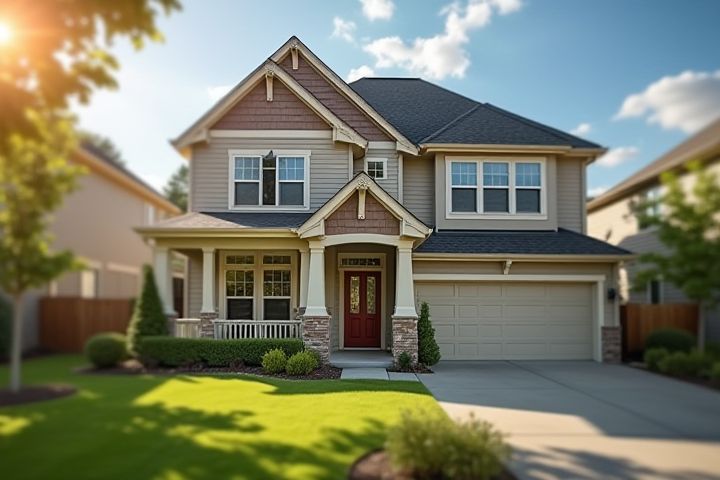
Renting a house to own, often termed as a rent-to-own or lease option agreement, allows you to lease a property with the potential to purchase it later. Typically, a portion of your monthly rent goes toward the eventual down payment, making homeownership more accessible. This arrangement often includes a specified purchase price, which can safeguard you against market fluctuations. It's essential to review the terms carefully, as they can vary significantly between agreements. If you're considering this option, ensure you understand your rights and obligations to avoid potential pitfalls.
Can You Rent A House To Own
Rent-to-own agreements
Rent-to-own agreements provide a pathway for individuals looking to purchase a home while initially renting. Under this arrangement, a portion of your monthly rent is typically applied toward the home's purchase price, allowing you to build equity over time. This structure benefits both tenants and landlords, as tenants can secure their future home while landlords maintain occupancy during the rental period. When entering a rent-to-own agreement, it's crucial to understand the terms, including the purchase price, lease duration, and maintenance responsibilities.
Option fee requirements
Rent-to-own agreements often require an option fee, which typically ranges from 1% to 5% of the home's purchase price. This non-refundable fee secures your right to buy the property and is usually credited towards the purchase price if you decide to buy later. It's essential to clarify the terms regarding the option fee in your contract, including how it can impact your overall down payment. Always ensure that you understand the timeline for exercising your option to purchase, as this will affect your financial planning and potential investment in the property.
Lease duration
A rent-to-own agreement typically features a lease duration that ranges from one to three years, giving you ample time to secure financing or improve your credit score. During this period, a portion of your monthly rent may be applied towards the eventual purchase price of the home, making it a valuable investment. It's important to carefully review the terms related to renewal options, maintenance responsibilities, and purchase price agreements within the lease. Understanding these details can help you make an informed decision about transitioning from renting to homeownership.
Credit score impact
Renting a house to own can significantly impact your credit score, especially if you make timely rent payments that are reported to credit bureaus. Typically, a good credit score ranges from 700 to 850, while a fair score falls between 580 and 699; your rental history might help improve a lower score. Some programs allow for a portion of your rent to be applied towards the purchase price, enhancing your financial investment. Regular payments can demonstrate your reliability, potentially leading to better mortgage rates when you decide to finalize the purchase.
Purchase price agreement
Renting a house to own typically involves a Purchase Price Agreement that outlines the terms of the eventual sale. This agreement specifies the purchase price, often based on the current market value or a predetermined amount agreed upon at the onset of the rental period. Generally, a portion of the monthly rent can be credited toward the down payment, allowing you to build equity over time. Negotiating this agreement is vital, as it safeguards your interests and defines your rights and obligations during the lease-to-own process.
Maintenance responsibilities
In a rent-to-own arrangement, typically, the tenant may be responsible for routine maintenance and minor repairs, which can range from landscaping to plumbing issues. Lease agreements should clearly outline these maintenance responsibilities, often specifying that the tenant handles all upkeep for both the interior and exterior of the property. It is crucial for you to check the precise terms, as some agreements may require the landlord to address significant repairs, such as roof damage or HVAC system failures. By understanding your maintenance obligations, you can ensure the property remains in good condition and avoid disputes with the landlord.
Legal consultation necessity
Rent-to-own agreements typically entail both leasing and purchasing aspects, which can complicate legal obligations. Engaging a legal consultant is essential, as they can clarify terms such as option fees, purchase price, and maintenance responsibilities. In 2022, disputes over rent-to-own contracts increased by 30%, highlighting the need for thorough legal review. Protect your investment and ensure fair practices by seeking professional advice before entering into any agreement.
Negotiation of terms
Rent-to-own agreements typically involve negotiating key terms such as the purchase price, rent credits, and duration of the rental period. You should aim for a realistic purchase price, often based on current market values, to avoid overpaying later. Rent credits, which can be a percentage of your monthly rent applied toward the future purchase, are crucial; expect around 10% of your monthly rent to be allocated as credit. It's essential to define the terms of maintenance responsibilities and who covers repairs to prevent disputes as you transition from renter to owner.
Potential market risks
Rent-to-own agreements present potential market risks that could impact both you and the landlord. Price fluctuations in real estate markets can lead to higher purchase prices than originally agreed upon, potentially making the purchase less attractive. Interest rate changes can also affect your financing options, with a 1% increase potentially adding thousands to your overall mortgage costs over 30 years. Additionally, unforeseen property maintenance issues can arise, requiring you to allocate funds unexpectedly, further complicating your financial commitments.
Rental payments inclusion
Rent-to-own agreements allow you to rent a property with the option to purchase it later. Typically, a portion of your monthly rental payment, often around 20-30%, is credited towards the eventual purchase price, effectively saving you money for the down payment. This structured arrangement can last anywhere from one to three years, providing ample time to improve your credit score or save additional funds. Always ensure that the terms clearly outline how much of each rent payment contributes to the purchase price, safeguarding your investment as you transition from tenant to homeowner.
